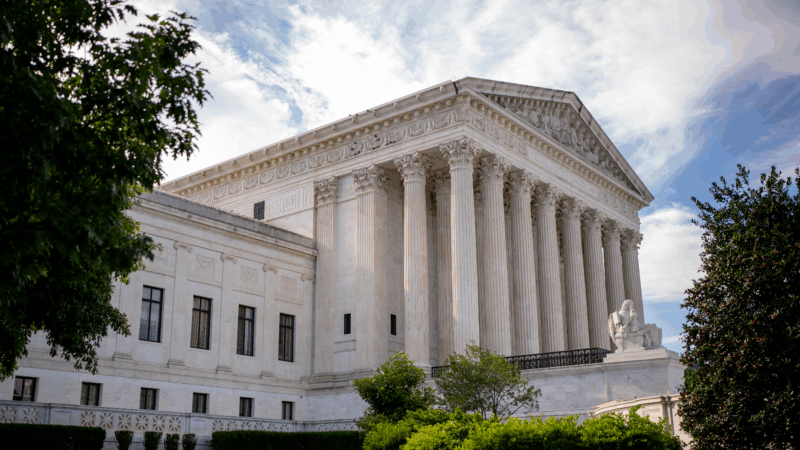Supreme Court justices appear divided in birthright citizenship arguments
At the U.S. Supreme Court Thursday, the justices heard a case that challenges the constitutional provision guaranteeing automatic citizenship to all babies born in the United States, but the arguments focused on a separate question: Can federal district court judges rule against the administration on a nationwide basis.
The justices appeared divided on the issue.
Several seemed skeptical of the Trump administration’s argument that lower courts should not have the right to issue nationwide injunctions.
Not seeing a play button? Click here.
“What do hospitals do with a newborn? What do states do with a newborn?” Justice Brett Kavanaugh asked Solicitor General D. John Sauer, the government’s lawyer, about how the federal government would enforce Trump’s order.
Justice Brown Jackson was more pointed.
“Your argument seems to turn our justice system, in my view at least, into a catch me if you can kind of regime … where everybody has to have a lawyer and file a lawsuit in order for the government to stop violating people’s rights,” she said.
But Justice Clarence Thomas seemed more receptive to Sauer’s argument, noting the U.S. had “survived” without nationwide injunctions until the 1960s.
New Jersey Solicitor General Jeremy Feigenbaum, who represented the 22 states suing the government, told the court that nationwide injunctions should be available in “narrow circumstances” — like this case involving birthright citizenship.
Kelsi Corkran, who represented pregnant women and immigrant rights groups in the case, suggested allowing nationwide injunctions only when the government action is deemed by plaintiffs to be violating the Constitution. She argued that an injunction limited to only parties in the case would not be “administratively workable.”
President Trump has long maintained that the Constitution does not guarantee birthright citizenship. So, on Day One of his second presidential term, he issued an executive order barring automatic citizenship for any baby born in the U.S. whose parents entered the country illegally, or who were here legally but on a temporary visa.
On Thursday, he posted on Truth social that “it all started right after the Civil War ended, it had nothing to do with current day Immigration Policy!” — and repeated incorrect claims that the U.S. is the only country with birthright citizenship.
Immigrant rights groups and 22 states promptly challenged the Trump order in court. Since then, three federal judges, conservative and liberal, have ruled that the Trump executive order is, as one put it, “blatantly unconstitutional.” And three separate appeals courts have refused to unblock those orders while appeals are ongoing. Meanwhile, Trump’s legal claim has few supporters.
Nonetheless, the Trump administration took its case to the Supreme Court on an emergency basis. But instead of asking the court to rule on the legality of Trump’s executive order, the administration focused its argument on the power of federal district court judges to do what they did here — rule against the administration on a nationwide basis.
This is a developing story and will be updated.
‘Dawson’s Creek’ star James Van Der Beek has died at 48
Van Der Beek played Dawson Leery on the hit show Dawson's Creek. He announced his colon cancer diagnosis in 2024.
A Jan. 6 rioter pardoned by Trump was convicted of sexually abusing children
A handyman from Florida who received a pardon from President Trump for storming the U.S. Capitol on Jan. 6, 2021, was convicted on state charges of child sex abuse and exposing himself to a child.
A country-pop newcomer’s debut is your reinvention album of 2026
August Ponthier's Everywhere Isn't Texas is as much a fully realized introduction as a complete revival. Its an existential debut that asks: How, exactly, does the artist fit in here?
U.S. unexpectedly adds 130,000 jobs in January after a weak 2025
U.S. employers added 130,000 jobs in January as the unemployment rate dipped to 4.3% from 4.4% in December. Annual revisions show that job growth last year was far weaker than initially reported.
Greetings from Mexico City’s iconic boulevard, where a dog on a bike steals the show
Every week, more than 100,000 people ride bikes, skates and rollerblades past some of the best-known parts of Mexico's capital. And sometimes their dogs join them too.
February may be short on days — but it boasts a long list of new books
The shortest month of the year is packed with highly anticipated new releases, including books from Michael Pollan, Tayari Jones and the late Nobel laureate Mario Vargas Llosa.






